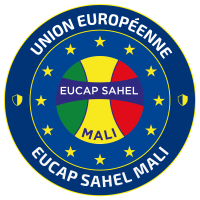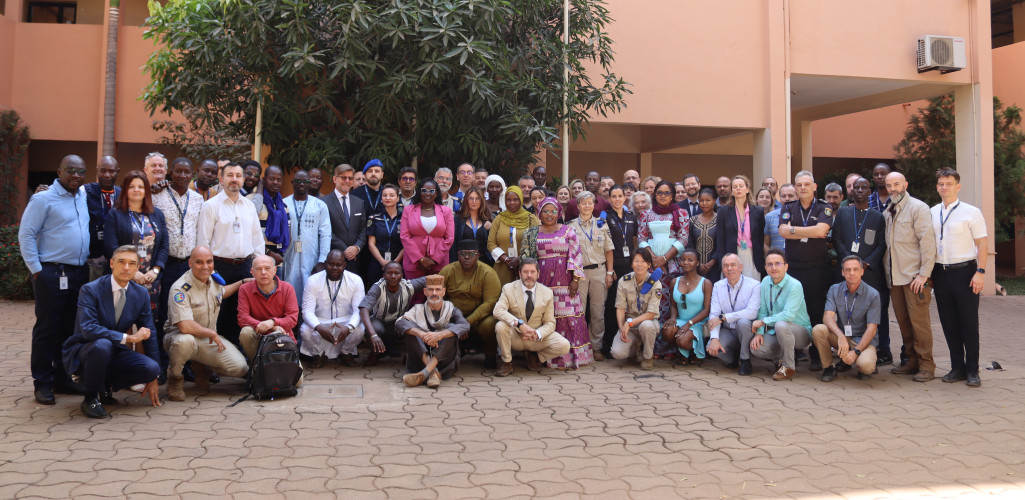About EUCAP Sahel Mali
Mandate
EUCAP Sahel Mali is the European Union's civilian mission in Mali, based in Bamako. Launched on 15 January 2015, the non-executive capacity-building mission supports the reform of the security sector and works towards the strengthening of the effective and transparent management and accountability of the internal security forces.
At the request of the Republic of Mali, the EU Capacity Building Mission in Mali, EUCAP Sahel Mali, was established by COUNCIL DECISION 2014/219/CFSP of 15 April 2014.
EUCAP Sahel Mali supports the implementation of the Malian government's security sector reform by providing strategic guidance, supporting capacity-building and infrastructure projects within the scope of the internal-external security nexus.
The Mission helps build the capacities of the Internal Security Forces (ISF) in the areas of crisis management, integrated border management, ISF-civilian population relations, access to justice and training within the various ISF structures.
On 10 January 2023, the Council Decision 2023/96 adapted the Mission’s structure and activities to the changing operational environment and the needs of its partners, in particular to:
- improve the effectiveness of the ISF in terms of civilian capabilities;
- promote the presence of the ISF and their interoperability throughout Mali;
- strengthen the role of the administrative and judicial authorities, by contributing to the prevention of corruption and impunity.
As a non-executive civilian mission, EUCAP Sahel Mali focuses on capacity building and national ownership by its various Malian partners, while complementing the EU's Common Security and Defence Policy.
On 27 January 2025, the mandate of EUCAP Sahel Mali has been extended by Council Decision 2025/166 until 31 January 2027.
As a non-executive civilian mission, EUCAP Sahel Mali focuses on capacity building and national ownership by its various Malian partners, while complementing the EU's Common Security and Defence Policy.
Priority areas
As the EU’s civilian mission supporting security sector reform and capacity building for the Internal Security Forces (ISF), EUCAP Sahel Mali's activity focuses on three priority areas. In summary they are
- Strengthening institutional capacities
- Participation in border management
- Support for civil society actors.
1. Strengthening institutional capacities by providing support to the various departments and units of the Ministry of Security and Civil Protection (MSPC) and the Ministry of Justice and Human Rights (MJDH)
Within the MSPC, the Mission works with
- The General Directorate of the National Police (DGPN)
- The General Directorate of the National Gendarmerie (DGGN)
- The General Directorate of the Technical and Scientific Police (DGPTS)
- The Directorate of Human Resources (DRH) and the Inspectorate.
EUCAP Sahel Mali also works with units that report to the MSPC, such as the Central Office for the Fight against Drugs (OCS), the Crisis Coordination and Management Centre (CECOGEC) and the Security Sector Reform Commission (CRSS).
Within the DGPN, the Mission collaborates on a regular basis with the Border Police (DPAF) and the Brigade for the Suppression of Migrant Smuggling and Trafficking in Human Beings (BRTMTEH) and provides support for training courses organised at the National Police Academy.
With regard to the DGGN, EUCAP Sahel Mali collaborates with
- The Communication Division
- The Finance Sub-Directorate
- The Logistics Sub-Directorate
- The Judicial Investigation Service
- The Bamako River Brigade
- The Command of Schools and Training Centres
In relation to the Ministry of Justice and Human Rights, the Mission works with:
- The National Directorate for Human Rights (DNDH)
- The National Directorate of Judicial Affairs and the Seal (DNAJS)
- The National Directorate of Justice Administration (DNAJ)
In addition, EUCAP Sahel Mali works with the three judicial centres of the Ministry of Justice:
- The National Judicial Unit specialising in the fight against cybercrime
- The National Economic and Financial Judicial Unit
- The Anti-Terrorism Unit
2. Participation in border management
As part of the broader framework for the implementation of Mali’s national border strategy, the Mission supports the ISF in the fight against:
- Irregular immigration
- Terrorism
- Organised crime
- Illicit trafficking
- Human trafficking
3. Support for civil society actors to strengthen ties between the Internal Security Forces (ISF) and the population
The Malian security sector is facing a lack of knowledge among the population regarding the missions of the ISF as well as a lack of trust between the various stakeholders, particularly between the ISF and the population.
As part of its efforts to promote trust between key actors involved in security governance, EUCAP Sahel Mali supports capacity-building and exchange activities in collaboration with:
- The Security Sector Reform Commission (CRSS): particularly in operationalising the Security Advisory Committees (CCS) in support of the implementation of the national security sector reform strategy.
- Civil society actors: to create conditions conducive to a better understanding of the ISF’s missions among the population.
Achieving these three priority areas depends on joint action by our:
1. Capacity building unit, composed of a team of twelve international and national trainers.
2. Advisory support unit, composed of a team of fifteen international and national advisors who have technical and operational expertise in their respective fields.
3. Project unit, responsible for developing and implementing secure and functional infrastructure and communication systems throughout Mali for the benefit of the MSPC and the MJDH.nd the MJDH.
Head of Mission: Peter Grabow KOLDING
On 11 April 2023, Mr. Peter Grabow Kolding started serving as Head of Mission of EUCAP Sahel Mali. In the Malian context he works continuously in a spirit of mutual cooperation with the Mission’s national partners in particular the Ministries of Security and Civil protection and the Ministry of Justice.
Mr. Kolding has worked for the Danish Ministry of Foreign Affairs since 1999 and is a seasoned diplomat with extensive work experience in crisis management. He has held senior positions at the Danish Embassies in Niger and Afghanistan and the Danish Foreign Ministry. He has conducted complex dossiers focused on the reconstruction of Ukraine and other engagements in Eastern Europe and Africa. He concluded a two-year term as Deputy Head of Mission of EUCAP Sahel Mali in 2022 and is not only a peace and security expert, but also a compelling advocate, communicator, and facilitator of partnerships, across a diverse range of cultures and nationalities.
Mr. Kolding holds a master’s degree in international Affairs with a focus on economics from Columbia University, New York.
Regional Advisory and Coordination Cell (RACC)
Support for stability and security in the Sahel is a priority for the European Union. In line with its approach to regionalizing the Common Security and Defence Policy (CSDP) in the Sahel since 2017, the Council of the European Union established this year a Regional Advisory and Coordination Cell (RACC), composed of a network of experts deployed within the European Union delegations present in Chad, Niger, Burkina Faso, Mali, and Mauritania.
Following its 2023 strategic review, the RACC is tasked with promoting the development of interoperability among security and defense forces by encouraging dialogue between countries and seeking common solutions to address shared challenges in the Sahel region.
Factsheets
Discover the latest facts and figures on EUCAP Sahel Mali.
Meet our team
At EUCAP Sahel Mali, our linguistic and cultural diversity is one of our greatest strengths. In this video series, we invite you to meet our colleagues — from Mali and from Europe — as they share a message in their own languages.


